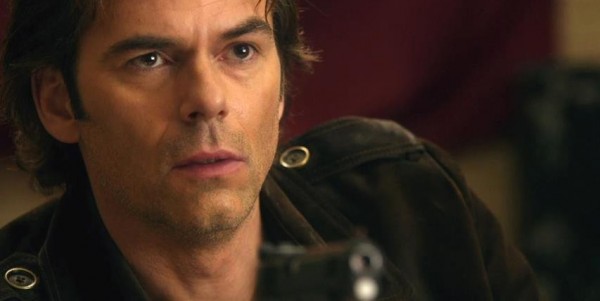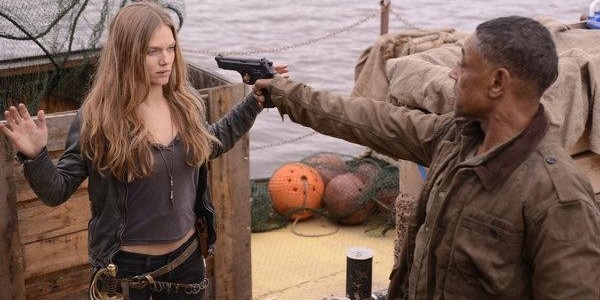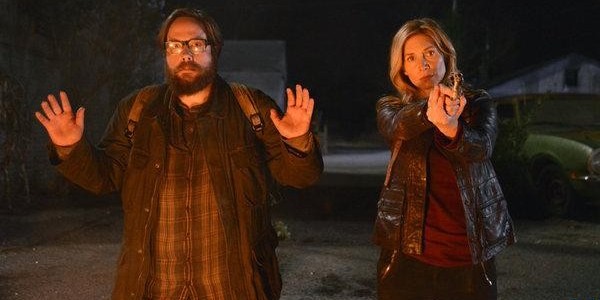
After last week's fantastic closing scene, expectations for this week's episode "The Love Boat" were considerably high, (with the prospect of Neville inserting himself into Miles' rebel group, antagonizing Miles, and creating all kinds of drama and/or potentially double-crossing him) instead we get another take on a hostage situation gone boring; suffice it to say that the episode does not live up to expectations. Seriously, how many more hostage situations are we going to be subjected to? We get it: people will do anything when you threaten the safety of a loved one. We have seen it time and time again on the show; there is no need to keep driving the point home. Is this the only tactic Miles (and the militia) knows? Surely the writers could write a storyline that has nothing to do with hostages/loved ones in peril that could also be dramatically engaging and drive the story forward. Aaron and Rachel's storyline is compelling enough without seeming overly repetitive; they reach an obstacle/conflict, they manage to evade danger, the stakes are raised, and we are given more mythology information. Also, there is a clear mission/goal Aaron and Rachel are trying to meet; they need to go to the tower and turn the lights back on. The goals pursued by Miles and the others are much more muddled and abstract; they want to defeat the Monroe militia, but it seems a near impossible task, and the involvement of the Georgia Federation certainly complicates the situation. They want to eliminate Monroe, but if they do succeed in killing him, then what? There is no clear endgame for their mission, so the writers get to meander a bit narratively, and what we have gotten is just isolated incidents each week in which Miles gets to play the hero, but these separate storylines don't come together to move the narrative forward. There needs to be an overarching arc in the series, rather than having small battles each week that don't make much of a difference in the general storyline.
The increasingly bleak/grim chronicles of Miles Matheson continue with "The Love Boat," in which Tom Neville joins the Georgia Federation and promptly serves as an irritable thorn in Miles' side. With Monroe injured and temporarily incapacitated, Neville plays the part of the main antagonist in this episode, even though he is technically working on the same side as our hero. With Neville now joining their camp, Miles' tactics take a pointedly brutal turn. It is easy for Miles to devolve and retreat to his old way of doing things, especially when he has someone that is knowledgeable about militia procedures. Neville was trained by Miles and has made his way up the ranks in the militia by being as ruthless as possible and will continue to be so, even when working with the "new" Miles, so Neville definitely acts as a bad influence, coaxing the callous "General Matheson" out of retirement. Neville is like the little devil in Miles' shoulder, urging him and tempting him into returning to his old ways.
Miles' dilemma is not a new one; again we see him struggle with who he used to be, trying to resist becoming that person yet again. For the past three weeks the narrative has weighed heavily on Miles' struggle with the past and not much has changed. How many more scenarios are we going to get in which Miles slips back into his old routine, or contemplates his regretful past? There is a sense of some self-awareness and genuine attempt to move on from Miles this week, brought out by Charlie's somewhat naive and persistent admonishment. If Neville is the devil on Miles' shoulder, then Charlie is the tiny, annoying angel, making his see the error of his ways. Still, while the show is about redemption, and Miles' tactics were cruel and harsh, the world they inhabit is absolutely barbaric and roughness is, at times, required.
It is a good thing Billy Burke is a capable actor because the perpetual state of depression into which Miles has sunk, while somewhat irritating and dull, doesn't come off as whiny or particularly weak. Burke portrays a strength that is comforting and communicates how this person, specifically, was able to form such a powerful militia. His work with Giancarlo Esposito is also fun to watch, as their contentious dynamic is entertaining and executed well by both actors. Neville's arc in the episode, however, is somewhat disappointing, since he isn't given much to do, and it isn't as fun or interesting as some of his earlier stories. Esposito always delivers a great performance, so it is a treat to see him onscreen, but Neville doesn't feel like a real threat in the episode, to Miles or to the Georgia Federation. We are supposed to believe that at any moment he could snap and kill the doctor or suddenly betray the rebels and compromise the mission, but that tension is just not felt. There are some great moments in which the character shows his insane brutality (similar to what we've come to expect from Monroe) like when he strikes both Charlie and Jason. In these moments he is completely unhinged and power hungry and over the top, and it's pretty fun to watch (Esposito knows how to play deranged tremendously), but they seem more like immature and impulsive reactions to a situation with which he is not comfortable. His apparent need to be in charge is not being satiated, and therefore he acts out like a child; it is difficult to take such juvenile behavior seriously.
More intriguing is the Aaron and Rachel narrative mostly because, as I stated before, their goal is clearly communicated, and their story holds much of the mystery of the show. Their storyline this episode is adequate - nothing mind blowing, but sufficiently entertaining. The stakes are raised as Rachel suffers from a gruesome compound fracture, which is high risk for infection and certainly life threatening, especially in their world. While I don't think that the writers have any plans to kill off Rachel (the show cannot suffer the loss of Elizabeth Mitchell), it definitely makes their goal more difficult to reach and might bring up interesting plot points for the remaining episodes. We also get some insight concerning the tower and Aaron's supposed importance in the whole thing. It is difficult believe that Aaron has been a piece of the puzzle all this time, because this development just seems like something the writers thought of for the episode and decided to throw it in, instead of a more carefully planned plot point. Shouldn't Dr. Warren have recognized Aaron, especially when he could be a threat to her precious nanites? I know the writers might have not wanted to give anything away, but it just seems implausible that there was absolutely no reaction/indication to anything. Ultimately, the dubious origin of this particular narrative thread doesn't really matter, as long as it is executed in a plausible and interesting way. The fact that Aaron's friendship with the Mathesons was no coincidence is unexpected and leads to many interesting questions. And, in perhaps the most absorbing part of the episode, Grace finally got the elevator in the tower to go down to the elusive level twelve. No surprise that there is something sinister, creepy, and homicidal in the lower depths of the tower. Oh, Maxim-reading guard, we hardly knew ye. What is down there? Some kind of crazy mutant-killer nanites? If so, will they make their way up now and attack Grace? Why did they stay in that level all this time? Are there people down there? Whatever did that to the guard didn't produce any human-like sounds.
Again, an average and mediocre episode gets by with a genuinely captivating and absorbing closing/final scene, which builds up a great sense of anticipation for the next week. However, judging by how infrequently we visit Grace, we probably will have to wait a considerable amount of time to find out what exactly is going on in the tower. Still, the questions that arise from the events of the episode are enough to make audiences come back, so hopefully we'll get treated to superior episodes in the last stretch of the season.
Random Thoughts
-- Why do shows insist on opening the episodes with the gimmicky time shifty "two days earlier" narrative device? It adds absolutely nothing to the story and ends up taking away time from more interesting narrative material. Instead we see basically the same event happen twice in an episode, and there are no revelations that would have made it worthwhile. Over it.
-- You'd think that two geniuses traveling across the country would have an adequate survivalist contingency plan in case of, um, running out of food! At least Rachel is pretty good with a gun and has sociopathic tendencies, so killing people is no problem for her. Aaron is developing his combat skills. Go Aaron!
-- Timothy Busfield is absolutely wasted in that thankless role. Come on writers/casting, you don't have such a capable and experienced actor sit around in the dark with a gun to his head. Busfield must be desperate for the work/cash; times are hard.
-- Spot the Mad Men actor! Michael Gladis as the Monroe militia dude completely removes me from the show and is hilarious. Paul Kinsey is a soldier?! So good.
-- Gotta give it up to Monroe, his "I.T guy" quip at Randall is pretty great. Is that fear or irritation in Randall's face? Decent moment between the two.
-- No mention of the lost bastard son, hope it stays that way. I doubt it.